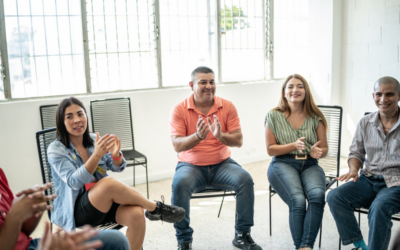October 7, 2024
The primary goal of Structured Diabetes Education is to promote change in lifestyles that will help people with diabetes live longer and healthier lives.
Our programme does this by providing people with knowledge about diabetes, its impact on the body and how to make small, achievable changes to their diet and lifestyle.
Our programmes are evidence-based and internally and externally quality-assured and reviewed by trained, independent assessors.
We do this to monitor our programme’s efficacy and the difference it makes.
EMPOWER in action: East and North Hertfordshire
For over six years, we have delivered our award-winning type 2 diabetes education programme, supporting people in East and North Hertfordshire.
As part of our ongoing commitment to audit and evaluate our programmes, we conduct patient questionnaires before and 12 months after a patient attends a course and acquire health data from patients’ General Practices.
Results
An evaluation of the data on 417 patients from local General Practices reveals the following outcomes:
Attendees significantly reduced their relative HbA1c levels by 19.5%.
- Baseline 63mmol/mol
- Final 50.7mmol/mol
- Absolute difference 12.3mmol/mol
- Relative difference 19.5%
- P<0.001
- Observed effect size 0.65
HbA1c (glycated haemoglobin) is when the glucose in the body sticks to red blood cells. With type 2 diabetes, the body can’t use the sugar properly, so more sticks to blood cells and builds up in the blood.
HbA1c levels are the average blood glucose levels for the last two to three months.
A high HbA1c means there is too much sugar in the blood. Patients with a high HbA1c are more likely to develop diabetes complications, such as problems with their eyes and feet. Therefore, patients with type 2 diabetes need to try to reduce their HbA1c levels and get them checked regularly. Our programme resulted in a 19.5% relative reduction of Hba1c levels.
Medicine use decreased showing an overall net reduction of 5.7%
In type 2 diabetes, it’s common for patients to need more medicine over time to help control their blood sugar (glucose), especially in the first few years after diagnosis.
But in this group of patients from East and North Herts, the opposite happened. Instead of needing more medicine, they used less over time—a 5.7% overall decrease. Fewer medicines can mean fewer side effects and lower costs, benefiting patients and the NHS.
Improvements to patient confidence and wellbeing
Patients said they felt more confident in making healthy food choices, staying active, knowing when to reach out to healthcare professionals, and doing the things they enjoy without diabetes holding them back.
Additional positive indicators
Although the clinical data provided by GPs is limited, our data shows improvements in both weight and blood pressure.
What do our patients think?
Our data also shows that 9.83/10 people would recommend the course to their friends and family.
“I was hesitant at first if the course would actually be able to provide me with extra help as I’ve been diagnosed and learning about my condition for a year now. Thankfully, I was wrong. The lesson was an actual tool for me. The instructor named Benita covered all my gaps and 4 hours passed like water. Excellent course and amazing instructor.”
Ioanna Psarrou, EMPOWER Type 2 attendee.
Are you interested in working together?
Wherever you are in the world, we can provide our Train the Educator programme. By becoming one of our licenced partners and accredited healthcare educators, you can deliver our award-winning diabetes education.
If you’re in the UK, we can offer several services besides our Train the Educator programme, including a full end-to-end referral, management, and evaluation service.
Get in touch to find out more.
CLI5107SEP24


